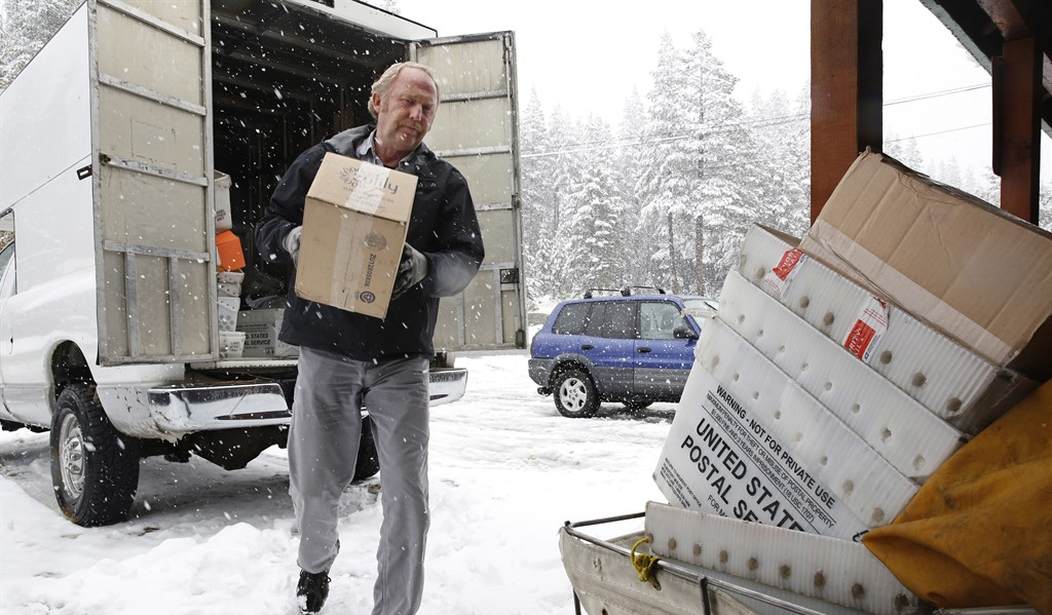The Firearms Policy Coalition and Second Amendment Foundation are asking a federal judge to toss out the prohibition on firearms in U.S. postal facilities, arguing that such a widespread ban has no place in the national tradition of gun ownership and runs afoul of the Second Amendment's protections.
The groups first filed suit in the federal court in Fort Worth, Texas back in June, and the DOJ responded to the complaint in mid-August. In their reply, the Justice Department argued that under both Heller and Bruen the ban was constitutional, but provided no evidence whatsoever that post office buildings, which were around in 1791, were considered "sensitive places" at the time.
Instead, as FPC and SAF point out in their request for summary judgment, the federal government admitted in a separate challenge to the "gun-free zone" designation for post offices that the prohibition wasn't codified into law until 1972. Banning firearms in post offices isn't a "longstanding tradition", but a relatively recent addition to federal law.
Historically, Congress took entirely different approaches to the problem. For one, Congress sought to deter robbery of the mail by punishing it with death. For another, Congress appears to have responded with greater law enforcement. But perhaps most tellingly, Congress in 1799, concerned about violence towards postal employees, prohibited “threatening [such employees] with dangerous weapons” but did not outright ban the carriage of “dangerous” weapons (let alone all weapons) on postal property.
Later history confirms an utter absence of Founding era regulation on carry in Post Offices and on postal property. Again, later Congresses were aware of violent threats to the mail. For example, “[p]assengers of nineteenth-century stagecoaches, which carried mail, ‘risked death or injury if coaches were attacked by robbers or Indians.’” And “[i]n the latter half of the nineteenth century,” as well as the early twentieth century, “bandits threatened postal workers aboard trains.” To protect against robbery, Congress “in the first half of the nineteenth century appropriated money to reward individuals who helped apprehend postal robbers.” And in the early twentieth century, the United States addressed the robbery problem by arming railway mail clerks.
Violence in post offices or committed against postal employees isn't an "unprecedented societal concern" that might lead a court to conclude that the DOJ doesn't have to find any analogous laws in U.S. history to uphold the current prohibition. As the FPC and SAF brief makes clear, Congress was concerned about those types of crimes from the earliest days of the Republic, but it wasn't until the 1960s that the legislative branch imposed a gun ban in government buildings, and it didn't specifically prohibit the lawful carrying of firearms in postal facilities until the 1970s.
In Bruen, the Supreme Court said "even if a modern-day regulation is not a dead ringer for historical precursors, it still may be analogous enough to pass constitutional muster. For example, courts can use analogies to 'longstanding' 'laws forbidding the carrying of firearms in sensitive places such as schools and government buildings' to determine whether modern regulations are constitutionally permissible."
Note, however, that the Court did not declare that all bans on firearms in schools and government buildings are constitutional. Quite the opposite. SCOTUS at least suggested that if there is no "longstanding" law forbidding the carrying of firearms in those locations, then a modern regulation would not be constitutionally permissible. Quoting again from the FPC/SAF request for summary judgment:
Recall that the Federal Facility Ban bars firearm carriage in Post Offices and the Postal Property Regulation prohibits carriage and storage on any property under the Postal Service’s control. The Carry Ban thus sweeps quite broadly. Individuals who visit a Post Office may not have a firearm in their car if they park at the Post Office or on their person if they walk or take the bus to the Post Office, and they may not have a firearm when they leave the Post Office to travel elsewhere. Indeed, for those who must visit Post Offices in their daily lives, the Carry Ban effectively renders licensed carry outside of the home impossible in many circumstances, a much broader restriction than a carefully limited prohibition on carry in a “sensitive place.”
And even if that were not the case, Post Offices are simply not sensitive places. While the Bruen Court did not delineate an all-encompassing list of sensitive places, it mentioned only three such locations at the Founding “where weapons were altogether prohibited”: legislative assemblies, polling places, and courthouses. Accordingly, this Court may analogize to “those historical regulations of ‘sensitive places’ to determine that modern regulations prohibiting the carry of firearms in new and analogous sensitive places are constitutionally permissible.” But there is no way to connect the Post Office to these discrete categories.
Each of those locations were all "protected by heightened, government-provided security", diminishing the need for individual citizens to bear arms in self-defense. I don't know about you, but my local post office isn't protected by any armed guards, metal detectors, or teams of security. There's nothing "sensitive" about them, other than the fact that the Biden/Harris administration wants to keep these facilities off-limits to lawful carry.
That shouldn't be nearly enough to justify keeping the law in place, and with any luck U.S. District Court Judge Reed O'Connor will grant the request for summary judgment. O'Conner has previously enjoined the ATF's rule on pistol stabilizing braces and forced reset triggers, but those cases weren't argued on Second Amendment grounds. Still, there's good reason to be optimistic about O'Connor's response to the request, especially given the government's failure to produce any historical analogues that would justify labeling thousands of postal facilities "gun-free zones" and turning lawful gun owners into criminals for carrying on postal service property.








Join the conversation as a VIP Member